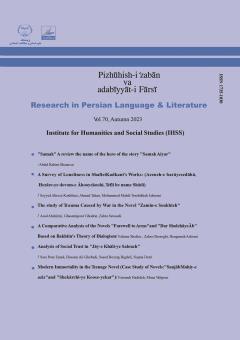Despite the existence of numerous works and hero-epics in Persian literature, it is noteworthy that they all have similar structures and consist of limited elements. Of course this is not a new subject. The structuralists like Levi Strauss, Vladimir Yakovlevich Propp, a
More
Despite the existence of numerous works and hero-epics in Persian literature, it is noteworthy that they all have similar structures and consist of limited elements. Of course this is not a new subject. The structuralists like Levi Strauss, Vladimir Yakovlevich Propp, and Frazer, have already discussed it. The present article studies ‘kin combat’ in the poems of: ‘Rostam and Sohrab’,’Borzunameh’,’Jahangirnameh’, based on a structural approach. According to findings of the research, the common fixed elements of these works are as follows: accidental visit of the hero to a foreign land, his accidental meeting with a daughter in a foreign land , his marriage abroad, hero’s leaving his wife, giving her a token , birth of an extraordinary baby, child’s departure to his father’s land, assistance of the father’s enemies’ to him, deception, defeating father’s vanguard army by child, father being called by the king to fight the child, asking each other’s names, triple combats, child introducing himself to father.
Manuscript profile


